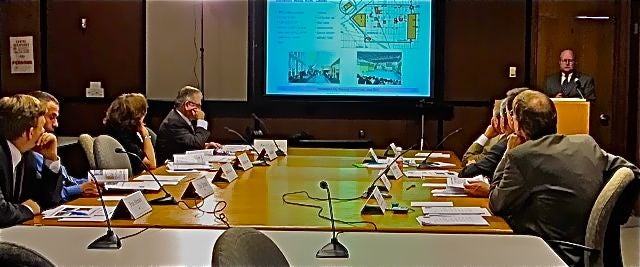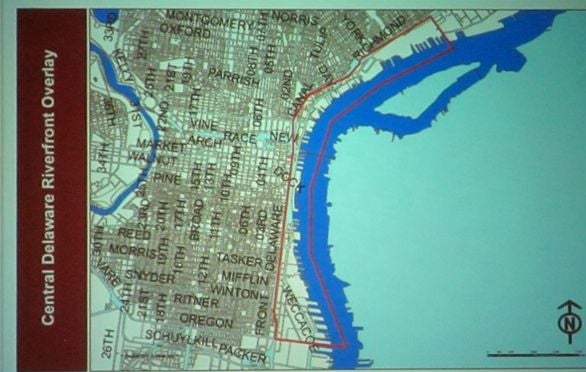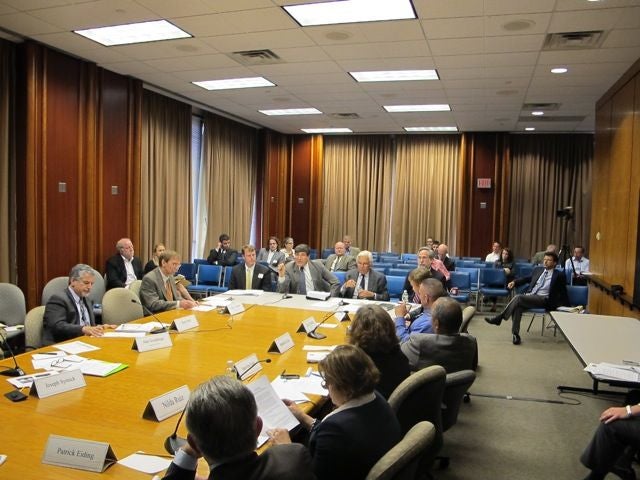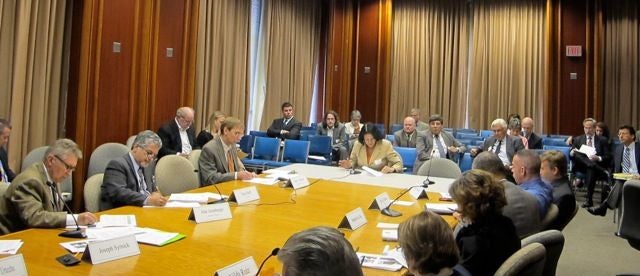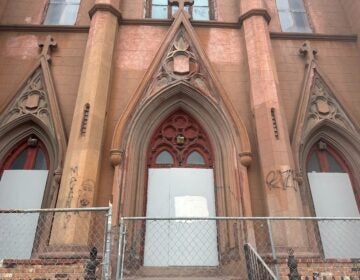A brisk agenda for Planning Commission, sort of
Clocking in at a speedy one hour and forty minutes, Tuesday’s monthly public meeting of the Philadelphia City Planning Commission was one of the briefest since the Nutter administration took over in January 2008.
Nonetheless, the commission was held over until early dinner time once again, owing to a special public hearing at 3 p.m., on issues pertaining to the new “Plan of Development” guidelines for the redevelopment of the Central Delaware Waterfront. The POD regulations, universally disliked by developers and community groups, were accepted by the Planning Commission at its April meeting.
Craig Schelter, executive director of Development Workshop Inc. and a former Planning Commission executive director, last month filed a request with the city for the hearing on the standards, insisting that they are too “open-ended” as written, lacking clarity and definitive terms. The regulations and submission requirements include proposed uses, details regarding hearings, deadlines, base zoning, density (scale, height, massing, etc.), landscaping, streetscaping and traffic, layout and design, and more.
During the meeting proper, the commission voted to approve of a staff plan to revitalize the Tioga neighborhood of North Philadelphia, and authorized the sale of a half dozen or more city properties and “scattered sites” throughout the city.
City property
Commission staffer Michelle Webb outlined the sale of sites in the First, Second and Fifth councilmanic districts, and was joined by Joan Schlotterbeck, the Commissioner of Public Property for the city. The city is responsible for some 10,000 abandoned or derelict properties, Webb said – contributing to blight, an increased chance of lawsuits and a large hole where no property taxes are paid.
In May, the Scattered-Site Disposition Pilot Program got started with the sale of eight properties for a total of $867,000. (See the city’s new Website for surplus property by clicking here.)
“The bidding was extremely excited because the market was dictating,” Schlotterbeck said. “We got a lot more than we probably would have if we had gotten them appraised.”
The three bills for additional scattered-site properties in three separate districts were approved by the commissioners.
Tioga
The commissioners voted to approve a plan entitled, “Tioga: Strategies for Neighborhood Revitalization.”
“In recent years, PCPC’s Community Planning staff has been providing intensive neighborhood planning services and technical assistance to community leaders in Tioga,” the staff reported. “The work has involved urban renewal project reviews, zoning cases, development review, and the Broad & Erie plan recently adopted by PCPC. This neighborhood plan is an appropriate culmination and summary of those efforts.”
Commission staffers met with members of the Tioga United community organization, which assisted in collecting some of the data for the plan. Staff also met with Councilwoman Donna Reed Miller who reviewed the document and sent out 200 print
copies of the draft for public comment.
About a third of the residents of Tioga (the neighborhood’s total population is roughly 10,000) is considered below the poverty line.
Trolley turn-arond
The commissioners also approved Bill 100376 – with reservations. The ordinance would close Manderson Street from Delaware Ave. to Frankford Ave. to vehicular traffic in order to facilitate the extension of the Girard Ave. Route 15 trolley tracks to a terminal loop on a parcel near the SugarHouse Casino. The commissioners are recommending that SEPTA create a passenger stop near the terminal loop so commuters working at the casino could get within a close walk of the facility.
Other business
Executive Director Alan Greenberger spoke of the commission’s new Facebook page, centered around the 25-year plan known as Philadelphia2035. On that page, you can see staff versions of the “mapping game” that will be a part of upcoming community meetings about the long-term plan.
You can also see a photo of Clint Randall, the commission’s newly hired Healthy Communities Coordinator. The position is being funded by the Center for Disease Control as part of the CDC’s national effort to improve the health of cities. Randall is charged with setting guidelines on topics such as access to fresh food, bicycle trails and recreational amenities.
Contact the reporter at ThomasWalsh1@gmail.com.
WHYY is your source for fact-based, in-depth journalism and information. As a nonprofit organization, we rely on financial support from readers like you. Please give today.




